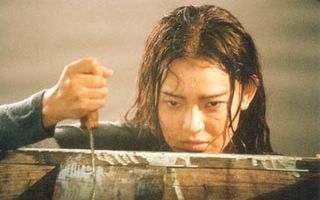The Isle
So, after enjoying Kim Ki-Duk's majestic Spring, Summer, Winter, Fall...and Spring from earlier this year, I had to check out the guy's other films. And the only other one available at Laser Blazer is this 2000 thriller, an allegorical horror story also set on an isolated Korean lake.
Ex-cop Hyun-Shik has come to the lake to escape some sort of violent trouble back in civilization. He has violent dreams and lives in constant fear of being seen, but beyond that, there's no information provided about his background. Attractive mute girl Hee-Jin runs something of a flophouse atop the lake, renting out floating candy-colored cabins to fisherman and dropouts. If the money's right, she'll even provide them with sexual favors, or at the very least, call on local prostitutes to get the job done.
Immediately, it's clear that she's fallen for Hyun-Shik, and this is where the problems begin. He's aloof, she's practically a stalker, and they seem unable to connect despite sharing a strong mutual attraction.
And beyond these loose narrative threads, that's all The Isle offers in the way of narrative. It's clearly an allegorical film, meant to be taken more as a parable about male-female relationships and human sexuality than as a story with a beginning, middle and end. But the performances are so good, and the storytelling so acute, you almost wish Ki-Duk would abandon his Big Message. The more peculiar and subjective the story becomes, the less focused his direction becomes. By the film's "twist" ending, I found myself at first bewildered by the apparent lack of meaning, but finally unconcerned.
This is not to say The Isle isn't worth a viewing. Like Spring, Summer, Ki-Duk's masterpiece from this past year, the film boasts stupendous cinematography, bringing its bucolic setting to detailed, beautiful life. The gentle rocking of the waves offsets the tumultuous aggression within the cabins, and the sight of a row of pink, purple and yellow houses resting lightly atop a mist-capped lagoon is one I'm not likely to forget any time soon. Part of the magic of international cinema is its ability to transport a scruffy, non-worldy American like myself to this sort of hidden vista, a place and time that, only 100 short years ago, it would have been impossible for me to ever gaze upon. It's easy to forget about the simple beauty of film imagery in this era of quick cuts and CGI, but seeing a film like The Isle, so taken with the meaning and significance of the visual world, serves as a pleasant reminder.
And not all of Ki-Duk's ideas are completely obscured, either, though I wish he could have found some more resolution to bring all his various metaphors together. The film works on several levels, tying together a love story with fishing metaphors, social commentary and a loose thriller plot involving Hee-Jin's occasionally homicidal nature. Two scenes in particular come to overpower every other idea in the film, and without giving away the specific nature of these sequences, let me just say they are (1) disgusting and (2) exceptionally well-realized. Taking a violent, gruesome concept like Ki-Duk does and finding ways to make it emotional and cinematic can't be easy. Tarantino does it in the Kill Bill films, Miike does it in Ichi the Killer, and Ki-Duk does it in The Isle, using a potent visual image of gore so extreme it would normally turn any reasonable audience against a film, in a way that enhances the artistry of the film.
Up until the first gruesome scene, concerning Hyun-Shik's highly inadvisable plan for avoiding capture by the police, I was right with the film. For the first hour, it's an insightful look at humanity freed from the bonds of civilization. Hyun-Shik comes to this "island" to escape from reality, but what he finds is a world where none of the traditional rules of life apply. Hee-Jin doesn't just run the island as a business, she seems to embody it, to have blended with it spiritually over time.
There's a strange sequence when a prostitute, after visiting with Hyun-Shik in his cabin, calls to Hee-Jin for a boatride back to the shore. When Hee-Jin doesn't respond, the girl realizes there is no way for her to leave this cabin. She can't go see her other clients, she can't report back to her pimp, she can't even use the bathroom (without resorting to urinating through a hole in the floor of the float). Her entire existance is dependant suddenly on this odd woman who doesn't speak, who can (and does) decide on a whim to murder a tenant and dump their body into the lake. Hee-Jin can see everything going on in the lake, and in a funny way seems to desire complete control over all its inhabitants. It's a creepy turn by the lovely Korean actress Jung Suh.
To be fair, only the final few sequences of The Isle didn't play for me. Up until then, the film was a bit fuzzy and difficult to get a handle on, but also satisfying, engaging and wonderfully paced. But by the final few scenes, Ki-Duk leaps completely out of the bounds of narrative and into full-on experimental mode, and I'm not sure I was ready to follow him there. My co-worker Ivan commented that the ending reminded him of Tartovsky's Solaris, and I can certainly see the connection. But that film works entirely on the level of abstraction, whereas The Isle seems to have more to say about its characters and their specific situation.
It's a terrific film, really, filled with memorable imagery. And its lack of dialogue and openness to interpretation make it a film I can imagine revisiting, gleaning a greater appreciation for its peculiar charms (and possibly a greater understanding of its intent) over time. Not as good as Spring, Summer, Fall, Winter...and Spring, but few films are.

No comments:
Post a Comment